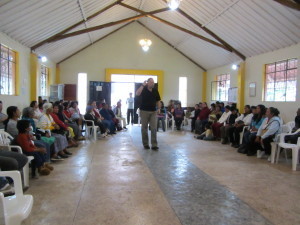Miguel Labrador's Blog, page 23
January 5, 2013
Why Leadership and Effectiveness Are Not Benchmarks of Discipleship.

 I saw a tweet this morning that said “Leaders can’t be effective at making disciples if they aren’t discipled themselves.”
I saw a tweet this morning that said “Leaders can’t be effective at making disciples if they aren’t discipled themselves.”
At first glance, it looked pretty good. Then I read it again. I asked myself why the words “leaders” & “effective” were injected into the phrase? It unsettled me. Why couldn’t it be simply, “disciples can’t be fruitful at making disciples if they aren’t discipled themselves? You may say, THAT’S JUST SEMANTICS! It is! But words mean things. Church words are often wrapped in unbiblical preconceptions, dried, and made into palatable energy pellets to power our unsanctioned actions. To put it more simply, the way we define words, especially biblical words, will define how we act.
I think for the most part, that the church should stop trying to make leaders and make disciples instead. Leadership is a by-product of discipleship. It’s the spam of the ham. There can be a wide gap between what’s considered good leadership and good discipleship, leaders and disciples. Isn’t it odd that the default benchmarks for effectiveness are often on leaders or leadership ability rather than discipleship and the ability to be a disciple or follower of Jesus. Church planting often seeks to put a leadership mechanism in place so that it can make disciples.
The church chases after effectiveness which is man centered. When it comes to the making of disciples, effectiveness is not the measure of one’s disciple making obedience. It’s the production or bearing of fruit. And neither of those are man centered either. What do I mean? Let’s take a look at 3 concepts:
Producing Fruit
Bearing Fruit
Being Fruitful
Producing Fruit – Most of the church’s attention, I fear, is on the first. We want to be fruit producers. This drives most of modern-day discipleship and leadership. Great lengths will be taken to tweak, genetically engineer, and make hybrids, to increase fruit production. There’s a difference between hard work, tilling the land, preparing the soil, maximizing fruit production, and claiming that we’re the ones who have actually produced the fruit.
So then neither the one who plants nor the one who waters is anything, but God who causes the growth. Now he who plants and he who waters are one; but each will receive his own reward according to his own labor. 1 Corinthians 3:7-8
We are God’s fellow workers. Christ said “All authority had been given to him, therefore Go and Make Disciples.” Matthew 28:18,19,20 Jesus didn’t say that since he’s been given all authority, he’s handing it all over to us to do with as we please. We go and make disciples “in the name of” or ”in the authority of” Jesus himself. The production of fruit is never a confirmation of right action on our part. It is always the sign of God working in us through Jesus. Hebrews 13:21 By the way, this alleviates none of our responsibility to obey.
Bearing Fruit – “All over the world this gospel is bearing fruit and growing, just as it has been doing among you since the day you heard it and understood God’s grace in all its truth.” Colossians 1:6 It is the Gospel which bears fruit. Again fruit bearing is not the result of our own efforts. We can be in a state of maximum fruit bearing, but that also is rooted in the one in whom we live and move and have our being. Acts 17:28 Notice too, that bearing fruit is dependent on God’s grace and truth. Yes, we are told to be fruit bearers (not producers), but this is wholly dependent on God as well. ”Remain in me, and I will remain in you. No branch can bear fruit by itself; it must remain in the vine. Neither can you bear fruit unless you remain in me.” John 15:4
Being Fruitful – The state of being fruitful also originates in God. ”"I will look on you with favor and make you fruitful and increase your numbers, and I will keep my covenant with you.” Leviticus 26:9 Yes, Adam and Eve, Noah after the flood, Jacob after the wrestling match, and we are told to be fruitful and multiply, but it is always God who makes us fruitful, increases our numbers, and makes us a community/assembly/church. Genesis 48:4
So, It’s time to stop chasing the winds of effectiveness and leadership and start seeking the will of God in Disciple Making.
Beloved, don’t sell your Disciple Making Inheritance
for a bowl of leadership soup.













CommentsLike you, perhaps, I'm trying to figure out how to ... by Tim DayThanks for commenting Wendy… I struggle with whether or not ... by Miguel“I think for the most part, that the church should stop ... by Wendy McCaigThanks for commenting Sister… As hard as it is to grasp, ... by MiguelLance, thanks for weighing in… I appreciate because of your ... by MiguelPlus 5 more...Related StoriesThe Dirty Dozen – Top Blog Posts of 2012Break the Ice and THEN Share the Gospel?This 1 Thing Could Change Discipleship Forever!
January 4, 2013
Did Jesus Teach This Through Paul?

 The Philippian Church was taught:
The Philippian Church was taught:
“Do nothing from selfishness or empty conceit, but with humility of mind regard one another as more important than yourselves; do not merely look out for your own personal interests, but also for the interests of others.“ Philippians 2:3,4
These words were penned by the Apostle Paul. The question is, did Jesus teach these words to the Philippians through Paul?













CommentsMy comment was to reflect on the fact, that the whole Bible is ... by Kirk StephensHe taught them to all people through Paul. I think the bigger ... by David WoodsKirk, It's one thing to say “faith without works is ... by MiguelTricky question – Tricky Answer by MiguelSame discussion as before. Should the whole Bible be in red ... by Kirk StephensJesus lived it. by Laurie NorrisRelated StoriesThe Dirty Dozen – Top Blog Posts of 2012Do the Old Testament Descriptions of Pastors Apply in the New Testament Era?Any Person is Capable of Any Sin
January 3, 2013
This 1 Thing Could Change Discipleship Forever!

 Within the Church there is much talk of Making Disciples, Disciples Making Disciples, Disciple Making Cultures, and Movements. It struck me that most of this talk occurs indoors? What if the Church were to reverse this trend? What if we simply strove to take Disciple Making outside? What if we primarily did it outdoors? Would that change discipleship forever?
Within the Church there is much talk of Making Disciples, Disciples Making Disciples, Disciple Making Cultures, and Movements. It struck me that most of this talk occurs indoors? What if the Church were to reverse this trend? What if we simply strove to take Disciple Making outside? What if we primarily did it outdoors? Would that change discipleship forever?
~
Ladies and Gentlemen…
Discipleship, Take it Outside!
For related posts, see:
Did Jesus have Discipleship Classes?












 Related StoriesThe Dirty Dozen – Top Blog Posts of 2012And the 3rd-Largest Religious Group in the World is…Break the Ice and THEN Share the Gospel?
Related StoriesThe Dirty Dozen – Top Blog Posts of 2012And the 3rd-Largest Religious Group in the World is…Break the Ice and THEN Share the Gospel?
January 2, 2013
Do the Old Testament Descriptions of Pastors Apply in the New Testament Era?

There are those that believe that the manner in which Old Testament saints gathered should not be used a model for New Testament congregations. Church = Temple, Priest = Pastor and so on…
Should these Old Testament descriptions of a Pastor, found in the book of Jeremiah, apply to the new covenant pastor?
And I will give you pastors according to mine heart, which shall feed you with knowledge and understanding. Jeremiah 3:15
Pastors are given by God, according to His heart, and they have the task of feeding others with knowledge and understanding.
For the pastors are become brutish, and have not sought the Lord: therefore they shall not prosper, and all their flocks shall be scattered. Jeremiah 10:21
Pastors are not to be “brutish,” which means senseless or stupid. If they are, they will not prosper as a pastor and will become flockless.
Many pastors have destroyed my vineyard, they have trodden my portion under foot, they have made my pleasant portion a desolate wilderness. Jeremiah 12:10
Pastors are not to be destructive of the work place (vineyard). They are step gingerly around the field and not damage young or new growth. They have the ability to turn an organic thriving Kingdom populace into a dry wilderness.
As for me, I have not hastened from being a pastor to follow thee: neither have I desired the woeful day; thou knowest: that which came out of my lips was right before thee. Jeremiah 17:16
Pastors are not to hasten to be Pastors nor make light of oaths to shepherd others.
The priests said not, Where is the Lord? and they that handle the law knew me not: the pastors also transgressed against me, and the prophets prophesied by Baal, and walked after things that do not profit. Jeremiah 2:8
Pastors are distinct from Priests and Prophets.
The wind shall eat up all thy pastors, and thy lovers shall go into captivity: surely then shalt thou be ashamed and confounded for all thy wickedness. Jeremiah 22:22
Pastors are first in line to be destroyed, consumed, and imprisoned.
Therefore thus saith the Lord God of Israel against the pastors that feed my people; Ye have scattered my flock, and driven them away, and have not visited them: behold, I will visit upon you the evil of your doings, saith the Lord. Jeremiah 23:2
Pastors will be recompensed according to their deeds.
Compare these multiple references from Jeremiah to the singular mention of ”pastor” in Ephesians 4:11
“And he gave some, apostles; and some, prophets; and some, evangelists; and some, pastors and teachers.”
Pastors are just one of many God gives to mature the church and unify it.
Do all of these descriptions of a Pastor in the Old Testament apply to Pastors today?
If not, which do not?
If so, what are the implications?












 Related StoriesWhy Calling me “Pastor” Creeps me out a bit.The Dirty Dozen – Top Blog Posts of 2012Is Persecution an Essential Requirement for Christian Growth?
Related StoriesWhy Calling me “Pastor” Creeps me out a bit.The Dirty Dozen – Top Blog Posts of 2012Is Persecution an Essential Requirement for Christian Growth?
January 1, 2013
Why Calling me “Pastor” Creeps me out a bit.

 Entering my 7th year on mission in the Cloud Forest Region of Ecuador, there are still folks who insist on calling me “Pastor.” I have never liked that title applied to me. In fact, I am amazed that it is a coveted title. Not amazed really, because here, it’s one of very few spiritually paid positions. Christians love titles. It actually makes me giggle when I hear people referring to themselves as “Bishop” so & so or “The Apostle” thus & such. But, that’s their issue, not mine.
Entering my 7th year on mission in the Cloud Forest Region of Ecuador, there are still folks who insist on calling me “Pastor.” I have never liked that title applied to me. In fact, I am amazed that it is a coveted title. Not amazed really, because here, it’s one of very few spiritually paid positions. Christians love titles. It actually makes me giggle when I hear people referring to themselves as “Bishop” so & so or “The Apostle” thus & such. But, that’s their issue, not mine.
I’ve taken many of those Ephesians 4 Spiritual Gift assessment tests and they always come out the same. My giftings, in order, are: Prophet, Teacher, Apostle, Evangelist, and Pastor. Yes, Pastor is last… It’s further complicated when some gets adamant about cementing by hyphen the “Pastor-Teacher” gifting.
The assumption, although I don’t know why, is that missionaries are automatically Pastors. Early on, I was convinced that I must force myself to fit in that role because it just made sense. When folks called me Pastor in the first couple of years on the mission field, I accepted it, but it always sounded “out of tune,” and a bit creepy. I thought that it was just my rebellious nature that refused to submit to all the pastoral preconceptions. I tried to be a Pastor, but it always felt like I was caught in an undertow and being drawn away from where and what God wanted me to be.
Someone even told me that I needed to start a church and “pastor” it. It never happened. I am a missionary. I am not a pastor. When she said that, she meant that I should be the head of a local church or regular gathering of local believers. There are times when I need to be pastoral, and I’ll admit I still struggle with it, but more often than not, I am quite comfortable operating in the prophetic. Now, before you get your shorts in a bunch, it doesn’t mean I go around predicting the future all the time. But it does mean that God puts thoughts and questions in my head and heart which I am compelled to communicate to others. I’ll develop that further in another post.
A friend recently asked me if I’d like to be in on the ground floor of starting a new seminary. I love the idea and will work towards that end as the Lord leads. In looking at and developing curriculum for this seminary, one said that we need to “teach Pastoral Theology.” That creepy feeling hit me again. If teaching Pastoral Theology means teaching people how to be pastors in the most commonly accepted church sense, then I’ll have to bow out of that segment. Earlier today on twitter, I said:
“In 2013, let’s take a break from “Pastoral Theology” & reconsider, theologically speaking, what it means to be pastoral.”
I think there is a huge difference between being pastoral and being a pastor. Truth is, my wife is way more pastoral than I am. I’m OK with that in this wonderfully upside-down Kingdom. But she, even with her enhanced super-human pastoral powers would not want to “pastor” a church. Together, we make a great ministry team of missionaries. When folks call me “Pastor” now, I just say, “I’m not a Pastor, I’m simply one who has been sent.” I think it creeps them out a bit. So, in that light, I’d like to ask a few questions:
Is it a good idea to assume that missionaries be pastors? Why or why not?
Is there a justifiable and biblical difference between being pastoral and being a Pastor?
Should we draw any conclusion from the fact that “Pastor” is only mentioned once in scripture?
*The image in this post is taken from one of David Hayward’s (AKA NakedPastor) works which you can see here.













CommentsI've had people call me “Pastor” because I spoke once at a ... by Tim DayIn the culture we work in, I think when the people and local ... by Claudia LabradorChris, good to see you brother… I am familiar with Alan's ... by MiguelDavid, thanks for the contribution to the discussion. All one ... by MiguelRob I think you've hit on something here. In your last line ... by MiguelPlus 5 more...Related StoriesThe Dirty Dozen – Top Blog Posts of 2012And the 3rd-Largest Religious Group in the World is…Is Persecution an Essential Requirement for Christian Growth?
December 31, 2012
Is Persecution an Essential Requirement for Christian Growth?

 The Christian Church by and large lauds, prays for, and financially support those who are being persecuted in the Name of Christ. Countless web sites, ministries, books, and articles are produced, and rightly so, to draw attention to their plight. Steve Green’s song, “The Faithful,” eloquently if not eerily describes their condition:
The Christian Church by and large lauds, prays for, and financially support those who are being persecuted in the Name of Christ. Countless web sites, ministries, books, and articles are produced, and rightly so, to draw attention to their plight. Steve Green’s song, “The Faithful,” eloquently if not eerily describes their condition:
In dark, filthy places, forsaken, forgotten
Our brothers and sisters are paying a price
They will not deny Him to purchase their freedom
For these are the faithful, the martyrs for Christ.
Twisted and broken, abandoned and beaten
Their bodies confined an unseen sacrifice
But deep in their spirits, they know perfect freedom
For they are the ones who’ve been set free by Christ
CHORUS
From under the altar the voices are crying,
“How long Lord, till you come judge the earth?”
But He’ll wrap and redeem them in robes of pure white
For the blood of the martyrs is the seed of the church.
For the blood of the martyrs is the seed of the church.
The deafening silence–their faithful refusal
To doubt or deny in the presence of men
They live by His promise before His own Father
That in His Kingdom, He’ll not deny them
The line in the chorus, “For the blood of the martyrs is the seed of the church,” come from Tertullian in 107 A.D. called Apologeticus or Apologeticum ”The Apology.” In that book Tertullian writes to the Roman governor who was trying to stamp out Christianity by making false accusations against its Christian citizens and persecuting (killing) them for it.
The Apostle Paul wrote in 2 Timothy 3:12 that “everyone who wants to live a godly life in Christ Jesus will be persecuted.” Paul did not see the suffering he and others endured as exceptional, but rather typical for anyone who wants to live a godly life.
With all of the above in mind, I have one multi-part question:
If persecution is a necessary component of any Christian life, then shouldn’t we be praying for and embracing it? Should we seek it out? Should we be thanking for God for it when it comes? Should we be trying to avoid it?












 Related StoriesThe Dirty Dozen – Top Blog Posts of 2012And the 3rd-Largest Religious Group in the World is…What If You Died Tonight? Is the Wrong Evangelism Question!
Related StoriesThe Dirty Dozen – Top Blog Posts of 2012And the 3rd-Largest Religious Group in the World is…What If You Died Tonight? Is the Wrong Evangelism Question!
December 30, 2012
The Absence of a Purely Gentile Gospel.

 In looking at all of the Gospel presentations in the New Testament, it struck me as odd that none of them were given to a purely gentile contextual audience. In other words, the NT recipients of those gospel presentations always had a basic understanding or knowledge of the story of Israel, Jesus’ birth, life, teachings, crucifixion, and resurrection. They had “context” from which they could lay hold of or interpret the Gospel.
In looking at all of the Gospel presentations in the New Testament, it struck me as odd that none of them were given to a purely gentile contextual audience. In other words, the NT recipients of those gospel presentations always had a basic understanding or knowledge of the story of Israel, Jesus’ birth, life, teachings, crucifixion, and resurrection. They had “context” from which they could lay hold of or interpret the Gospel.
Much of the criticism of today’s evangelism centers around it being too salvation focused. Scot McKnight calls those who have placed an overemphasis on the salvation aspect of the Gospel “Soterians.” Scot’s basic premise is that the plan of salvation is not the principle message of the Gospel.
He says in his book The King Jesus Gospel, “we have succumbed to the Plan of Salvation gospel, in a reduced soterian form, as the one and only gospel.”*
I get what Scot is trying to say. I understand that the Gospel is much more than just salvation. I agree. What bothers me though, is that we may delay getting the Gospel to those who need it most by waiting around to wrap our brains around the rest of the story. Exactly how much of the Gospel is needed for a person to receive Christ? Again, Scot’s premise is that the Gospel is the complete story of Israel and the consummation and continuation of that story. He says:
The Plan of Salvation flows out of the Story of Israel/Bible and the Story of Jesus. The Bible’s Story from Israel to Jesus is the saving Story. Just as we dare not diminish the importance of this Story if we wish to grasp the gospel, so also with the saving effects of the story. But equating the Plan of Salvation with either the Story of Israel or the Story of Jesus distorts the gospel and at times even ruins the Story.**
Getting back to the focus of this post. In every case where the Gospel is presented in the NT, we find either Jews, Non-Jewish Gentile proselytes, or those that have at least a basic understanding or context by which they can interpret the Gospel message. ”Wait!” you might say… “what about Mars Hill?” It is highly likely that some of those Epicurean philosophers had not heard the Gospel previous to Paul’s arrival, but Paul’s ministry of the Gospel began in the Synagogues. (Acts 17:17) Paul spoke to the Jews and the God-fearing Greeks or Gentiles.
Where are the Gospel presentations to the pure unbeliever or those who had no context? Perhaps I’m just not seeing it. My point is this, before we dismiss modern-day evangelism and criticize it by saying it focuses too much on getting people saved, we might want to consider that we can get to the rest of the story after a person is “in” Christ. Since we have no clear examples on how to present the Gospel to a purely gentile or contextually unbelieving audience, we may as well begin with the salvation aspect first. If we want to get the Gospel to where it’s not known and preach it to the whole of creation, then we had better include those people (pure unbelievers) who have zero contextual data by which they may interpret it. I would never advocate truncating the Gospel and I still believe Scot is right. Evangelism is preaching the Gospel, the whole Gospel. No single member of the body of Christ should ever limit evangelism to the winning of souls. The Gospel’s purpose is to make disciples of Jesus. (Acts 14:21) It is the power of God “Unto” not “Into” salvation for those that believe. (Romans 1:16) It’s the “Into” salvation mentality that drives most of evangelicalism. We have to shift to the “Unto” salvation paradigm. Then evangelism, or preaching the Gospel and discipleship become life long and unified concepts. It seems though that suggesting that others need to know and be able to tell the whole Gospel story only serves to provide an excuse for not evangelizing or putting it off until they do. A few questions:
Did I miss it? Is there a Gospel presentation in the New Testament to a purely unbelieving audience? Where?
Isn’t it more important to get some of the Gospel out than none at all?
If receiving and following Christ (salvation) is not the proper response to the Gospel, then what is?
*McKnight, Scot (2011-09-06). The King Jesus Gospel: The Original Good News Revisited (p. 145). Zondervan. Kindle Edition.
**McKnight, Scot (2011-09-06). The King Jesus Gospel: The Original Good News Revisited (p. 37). Zondervan. Kindle Edition.













CommentsThanks for the comment Lisa, Here's my thinking: “Into” ... by MiguelMiguel, I never did finish McKnight's book (thanks for the ... by Lisa RobinsonI can't help but agree with you in this. I think [imo] Scot's ... by Stephen GonzalezRelated StoriesThe Dirty Dozen – Top Blog Posts of 2012Break the Ice and THEN Share the Gospel?My 4 Most Productive Evangelism Questions in 2012
I didn’t ask Angelica to Pray The Sinner’s Prayer. Should I have?

 This post was originally written on July 23rd, of this year. It is being updated and reposted with some Great News. If you read the whole piece, you’ll see what I’m talking about.
This post was originally written on July 23rd, of this year. It is being updated and reposted with some Great News. If you read the whole piece, you’ll see what I’m talking about.
It’s a little town called “Guadalupe” at the edge of the Cloud Forest. We’ve been going there for a while, bringing the Gospel of the Kingdom, and have already seen many come to know Christ. Some of them have been baptized, and all of them are active in their faith. A little over a week ago, myself and a couple of brothers visited a family there in Guadalupe for the first time. We came simply saying, that we had a message from God for them. When we asked what they knew of Jesus, the man of the house said,
“I’ve heard of him, but don’t really know much about him or why he came to earth.”
I don’t know that a God Orchestrated
encounter could have been any clearer.
Today, myself and a couple of brothers (spiritual brothers) visited the same family again, and while the man of the house wasn’t there, we spoke with his wife. I shared a short story from Ezekiel 20 and then talked about an experience I had in helping some victims of a bus accident some time ago.
In a nutshell, I was traveling back to our home in the Cloud Forest, and came across a bus accident that had just happened. The injuries were extensive and they had already pulled out a few dead. There was a woman with serious injuries and bleeding and some had asked if I could carry her to a local hospital which I gladly did. We made it to the hospital only to be followed by an onslaught of other victims of the crash. The nurses and doctors were few and so they had to do triage in the parking lot. They had taken the woman out of my car and put her in the back of a nearby pickup truck laying down but conscious. A doctor came by and performed a quick examination and then left. While he didn’t say anything I discerned that his prognosis was not good and he was going to see if he could help someone else. I looked at a friend of mine who was with me and said, “you have to share the Gospel with her now!” My Spanish at the time was poor and I felt an extreme sense of urgency. He hesitated, but spoke a simple gospel message to her. Just a few minutes later the woman said, “Jesus Save Me, Jesus Save me, Jesus Save Me,” and died.
I’ll never forget that.
Why did I share this story with the woman in Guadalupe? I felt that it was appropriate for her in the moment. I and the others sensed that she was very close to repentance and belief. I reminded her that our days are not guaranteed and that it was God who arranged this encounter and it was Him who desired to have a relationship with her.
Normally for me in the past, and perhaps for many of you reading this, it would have been the perfect time to ask her if she wanted to “accept” Christ into her heart and say a “sinner’s prayer.” But, at this time, I didn’t. I told her that if she had any questions during the week, she should go into her room when all was quiet, ask God, and wait for an answer. We did pray for her and her household and told her we’d be back in a week. When we had gotten to the main road, I asked those with me if we should asked her to “Accept Jesus into her heart,” and “pray the sinner’s prayer,” and they said…
Well, I’m not actually going to tell you what they said, but I am going to ask you what you would have said.
In fact, I’m going to ask you 3 questions:
1. Was I wrong to not ask her if she wanted to receive Christ in that moment and pray the sinner’s prayer?
2. If she dies between now and next week, is her blood on my hands?
3. If I said that “getting others to pray a sinner’s prayer was actually more dangerous to a person’s spiritual condition than not praying it,” would you agree or disagree?
Before answering these questions, I want you to know that not a single person in Guadalupe who has recently come to faith and are living for Jesus ever prayed a sinner’s prayer.
UPDATE!
On December 29th 2012, both Angelica and her husband were baptized! Now I’ll tell you what my fellow harvest workers told me on the main road when I asked if we should have asked Angelica to “accept Christ into her heart,” or “pray the sinner’s prayer.” He said, “No, we’ll trust God as both the Author and finisher of her faith. We did, and here are the results:













CommentsNo, no and I would agree that the Sinners Prayer can ... by Karl IngersollFirst I had to go look up Ezek. 20! Not the usual “four ... by Dennis HesselbarthI like what Mary said, “I think God has many ways to reach ... by Marc WinterWell said! by Rick KnockHey Miguel. Well, from my own experience, when God saved me ... by Mary ElizabethPlus 5 more...Related StoriesBreak the Ice and THEN Share the Gospel?The Dirty Dozen – Top Blog Posts of 2012What If You Died Tonight? Is the Wrong Evangelism Question!
December 29, 2012
My 4 Most Productive Evangelism Questions in 2012














Comments1. Do you have any kind of spiritual belief system? 2. Who is ... by chosenrebelUnlike Russian children, my orphaned questions will always be ... by MiguelGood questions. Does the tense of your fifth question assume we ... by chosenrebelRelated StoriesThe Dirty Dozen – Top Blog Posts of 2012Break the Ice and THEN Share the Gospel?And the 3rd-Largest Religious Group in the World is…
December 28, 2012
The Dirty Dozen – Top Blog Posts of 2012

 According the APEST assessment, I am a PT or gifted in the Prophetic and Teaching. The characteristics of this combination are as follows:
According the APEST assessment, I am a PT or gifted in the Prophetic and Teaching. The characteristics of this combination are as follows:
Questions what has become normative.
Disturbs common thinking and practices.
Agitates for positive change.
Desires learning for purposes to influence.
Discerns the message of Truth
Seeks to ensure an authentic response to Truth
Core issue is one’s relationship with God
Urgency felt now, in the moment, “this must happen.”
Comfortable dismantling the present for future hope
Deep compassion for the cause of the people
Inspires all people to respond to God’s message
May communicate creatively to get message across
It seems that my top 12 blog posts of 2012 have centered around those characteristics. In truth, I never know what is going to make people react the way they do, but I am glad for the discussions. Many have contacted me offline to say how these writings have helped them in their personal faith and fellowships. Controversy for controversy sake is not helpful for the body of Christ, but sometimes divisions are helpful to show which among the body are recognized by God. (1 Corinthians 11:19) Some of these posts have comments where folks get what would be considered a bit nasty with others. I’ve done my best to maintain healthy and productive exchanges without disparaging the brethren. And so, in the order of most read/commented on:
2. Missions, Defining “Unreached,” and Marginalizing People Groups
3. Shouldn’t We Be Terminating Life Support for the “Sinner’s Prayer?”
4. Paul’s Engagement of the Athenians on Mars Hill, Epic Ministry Fail?
5. On the Subjectivity of the Spirit and the Objective Written Scriptures
6. The Rejection of The Gospel is a “Decision.”
7. I’m Sorry, Your First Baptism Doesn’t Count. You’ll Have to be Baptized Again!
8. Obey your “Pastors,” and submit to their authority… Wait a minute? Where’s that in the Bible?
9. The Merits and Demerits of Individual Discipleship.
10. Apologetics is not about “Defending the Faith.”
11. The Anti-Scripture Scriptures – Part IV
12. Christian Missions, Making Disciples & Cultural Contamination.
~
For those of you who are on Facebook, you may subscribe to this blog HERE
For those who would like to subscribe via Email or RSS feed, click HERE.
Check out my Ebook, “14 Shifts in Disciple Making and A Framework – A Dynamic E-booklet “
My next Ebook, “The Gospel Rock in my Pocket” will be released in Mid-February 2013













CommentsYou're kidding, right? Teacher and prophetic???? (Kind of ... by Jim WrightRelated StoriesAnd the 3rd-Largest Religious Group in the World is…Discipleship DegradationBreak the Ice and THEN Share the Gospel?






